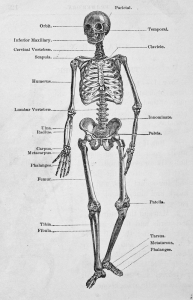<p>As we age, our bodies naturally go through myriad changes; but, this does not mean we cannot help but fall apart. Many conditions that affect us as we age can be prevented, or greatly reduced in severity, if we commit to taking better care of ourselves before they are set to manifest. Sure, we may not be able to keep our bones as strong as when we were 20, but it does not mean that those of us at risk of osteoporosis—a disease characterized by porous and fragile bones—must eventually succumb to it. Here are some important strategies for keeping your bones healthy and reducing your risk of this painful condition.</p>
<h2>Diet</h2>
<p>Like in the prevention of many other diseases out there, diet appears to play an important role in keeping bones strong and reducing your risk of developing osteoporosis. Calcium is vital for bone health, and good sources include dairy, broccoli, leafy greens, tofu, almonds and fortified foods and beverages such as orange juice. Other nutrients linked to bone health include magnesium, potassium, vitamin D and vitamin K—eating plenty of avocados, bananas, cantaloupe, honey dew, lima beans, nectarines, potatoes, spinach, whole grains, nuts, oatmeal peanut butter and cauliflower will ensure adequate intake of these various nutrients. Omega-3 fatty acids may also play a role in healthy bones—good sources include salmon and other oily fish, flax seed, walnuts and hemp seed.<br />
And, of course, there are the foods that you should limit or avoid if you want to maximize bone health. Keeping sodium intake low is one of the most important—according to WebMD, research has found that women with a high-salt diet lose more bone minerals than women with a lower salt intake. Besides the obvious of forgoing the salt shaker, watching your intake of processed foods is probably the best strategy since they account for about 75 percent of our intake. You also want to avoid soft drinks, which contain calcium-leaching phosphorus; and, if you cannot go without your coffee, keep caffeine intake to no more than 300 milligrams daily.</p>
<h2>Exercise</h2>
<p>Unsurprisingly, exercise is one of the most powerful natural strategies for preventing osteoporosis; remember that bone is living tissue that needs exercise to rebuild and repair. Weight-bearing cardiovascular activity is crucial and something as simple as walking fits the bill. Strength training is also vital—this type of exercise causes the muscles to put pressure on the bone, which in turn, helps strengthen them. Yoga may also be an effective form of exercise—there are a variety of poses that can specifically strengthen the bones.</p>
<h2>Supplements</h2>
<p>There are several natural supplements that may help ‘’supplement’’ your healthy lifestyle—remember, it is important not to look at pills as a substitute for cornerstones of prevention such as diet and physical activity. Many Chinese herbs for bone health aim not only to target the bones specifically, but to correct imbalances in the body that may directly impact bones. Herbs that have estrogenic properties may help preserve bone mass, such as red clover and black cohosh. Other potentially helpful herbal supplements include horsetail, kelp and oatstraw—all contain substances that may support bone growth. Consuming nutrients linked to bone health in supplement form may help as it allows you to get a bigger dose than you could from diet—examples include calcium, magnesium, vitamin K, vitamin D, omega-3 fatty acids and soy isoflavones. While all of these supplements are generally safe, taking them in higher doses may pose certain health risks, so it is important to discuss use with a knowledgeable healthcare provider.<br />
Kelli Cooper is a freelance writer who is passionate about natural health; if you are interested in learning more about Chinese herbal remedies for bone health, visit SolsticeMed.com for more information.<br />
Photo Credit</p>

Natural Strategies for Protecting against Osteoporosis
